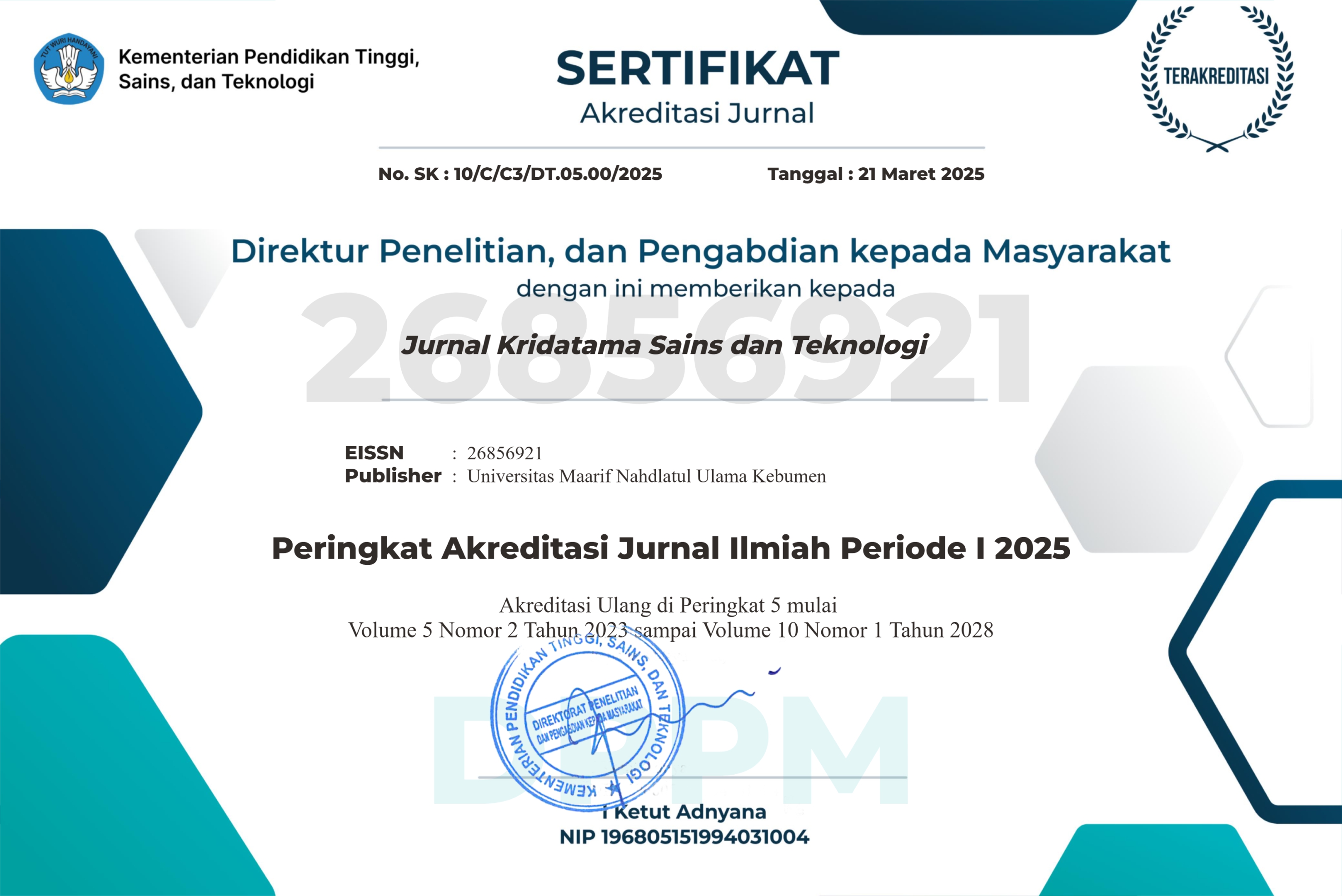Penggunaan Smartphone dalam Pembelajaran Model Creative Problem Solving terhadap Peningkatan Kreativitas dan Inovasi Siswa
DOI:
https://doi.org/10.53863/kst.v3i02.209Keywords:
Penggunaan Smartphone dalam Pembelajaran Model Creative Problem Solving terhadap Peningkatan Kreativitas dan Inovasi SiswaAbstract
This research aimed to analyze: (1) to describe the improvement from the ability of students’s creativity and innovation used learning based the creative problem solving by smartphone, and (2) to test the effect of learning based the creative problem solving by smartphone on creativity and innovation at student’s. Smartphone as a result of the progress of the digital era arre currently as instructional media collaborate with experimental learning model as an innovative and creative learning. This research was conducted on VII grade in 3 junior high school student’s at Kebumen with high, medium and low categories. The type of research was quasi experimental, used matching pretest-posttest control group design. The data retrieval technique was done by essay test. Data analysis used gain score and multivariate test. Research result: (1) based on the analysis in high category schools has obtained N-Gain values ??0.82 included in the high category, in medium category schools has obtained N-Gain values 0,8 1 included in the high category, and in low category schools has obtained N-Gain values 0,83 included in the high category.( 2) all of the category schools based on the multivariate test result that was used Hotelling's Trace showed a significance value <0.05, which gives an H0 rejected. Conclusion: all of the category school used learning based the creative problem solving by android have improvement and significant effect on the ability of student’s creativity and innovaion at Kebumen..
Keywords: creative problem solving, android, metaknowledge
References
Aguayo, R. (2010). The Metaknowledge Advantage. New York: Free press.
Agustin, M. (2011). Permasalahan Belajar dan Inovasi Pembelajaran. Bandung: Refika Aditama.
Anderson, L.W. & Krathwohl, D.R. (2001). A taxonomy of Bloom’s taxonomy of educational objectives. New York: Addison Wesley Longman.
Azevedo, R. & Aleven, V. (2013). International Handbook of Metacognitionan Learning Technologies. USA: Springer.
Cera, R.; Mancini, M.& Antonietti, A. (2013). Relationship between metacognition, self efficacy, and self regulation in learning. ECPS Journal. Vol. 7, pp.115-141.
Hake, R.R. (1999). Analyzing Change/Gain Scores. American Journal of Physics. Retrieved 11, 11, 2016. from: http/www.physics.indiana.edu.
Handel, M.; Artelt, C. & Weinert, S. (2013). Assessing Metacognitive Knowledge: Development and Evaluation of a Test Instrument. Journal for Educational Research. Vol. 5, No. 2, pp.162–188.
Hartman, H.J (2013). Metacognition in learning and Instruction. USA: Kluwer Academic Publisher.
Hashimi, S.; Satya, K. & Dave, M. (2010). Pro Android 2. New York: Springer-Verlag New York, Inc.
Isaken, S.G, Dorval, K.B. & Trefinger, D.J. (2011). Creative approaches to problem solving third edition. Los Angeles: SAGE Publications Inc.
Masari, G.A. & Anghel, O. (2012). Comparative study on developing metacognitive abilities of students from technical, vocational and human sciences. Journal of Social and Behavioral Sciences. Vol. 46, 4418-4422.
Mendikbud. (2014). Materi Pelatihan Guru Implementasi Kurikulum 2013 Tahun Ajaran 2014/2015 Mata Pelajaran IPA SMP/MTs (Edisi revisi). Jakarta: Kemendikbud.
Murphy, M.L. (2009). Beginning Android. New York: Springer-Verlag New York, Inc.
Rahimi, M & Katal, M. (2012). Metacognitive Strategies Awareness and Success in Learning English as a Foreign Language: An Overview. Journal of Social and Behavioral Sciences. Vol. 31, pp.73–81.
Schneider, R.M. & Krajcik, J. (2002). Supporting Science Teacher Learning: The Role of Educative Curriculum Materials. Journal of Science Education. Vol. 3, No. 3, 221-245.
Treffinger, D.J.; Isaksen, S.G. & Dorval, K.B. ( 2003). Creative problem solving (CPS version 6.1) a contemporary framework for managing change. Retrieved 10, 25, 2016, from www.cpsb.com.
Velzen, J.V. (2015). Metacognitive Learning: Advancing learning by Developing General Knowledge of The Learning Process. New York: Springer.
Velzen, J.V. (2017). Metacognitive Knowledge: Development, Application, and Improvement. USA: Information Age Publishing.
Widiyawati, Y. (2015). Pengembangan Perangkat Pembelajaran IPA Berbasis Creative problem Solving (CPS) untuk Meningkatkan Scientific Literacy dan Meta Knowledge Peserta Didik SMP. Thesis. Universitas Negeri Yogyakarta.
Downloads
Published
How to Cite
Issue
Section
License
LicenseAuthors retain copyright and grant the journal right of first publication with the work simultaneously licensed under a Creative Commons Attribution-ShareAlike 4.0 International License that allows others to share the work with an acknowledgment of the work’s authorship and initial publication in this journal

















